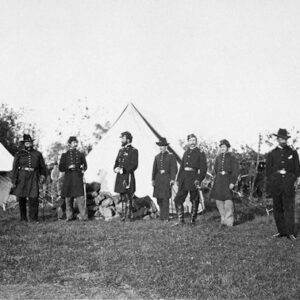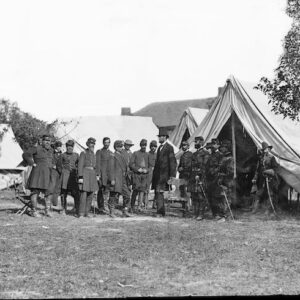Tag: Webb (Alexander S.)
 Wikipedia says: Alexander Stewart Webb (February 15, 1835 – February 12, 1911) was a career United States Army officer and a Union general in the American Civil War who received the Medal of Honor for gallantry at the Battle of Gettysburg. After the war, he was president of the City College of New York for thirty-three years.
Wikipedia says: Alexander Stewart Webb (February 15, 1835 – February 12, 1911) was a career United States Army officer and a Union general in the American Civil War who received the Medal of Honor for gallantry at the Battle of Gettysburg. After the war, he was president of the City College of New York for thirty-three years.
…At the outbreak of the Civil War, Webb took part in the defense of Fort Pickens, Florida, was present at the First Battle of Bull Run, and was aide-de-camp to Brig. Gen. William F. Barry, the chief of artillery of the Army of the Potomac, from July 1861 to April 1862. During the Peninsula Campaign, he served as Gen. Barry’s assistant inspector general and received recognition for his assembling an impregnable line of artillery defense during the Battle of Malvern Hill; Brig. Gen. Daniel Butterfield wrote that Webb saved the Union Army from destruction.
During the Maryland Campaign and the Battle of Antietam, recently promoted to lieutenant colonel, he served as chief of staff in Maj. Gen. Fitz John Porter’s V Corps. After Antietam, he was ordered to Washington, D.C., where he served as Inspector of Artillery. In January 1863 he was again assigned to the V Corps, now commanded by Maj. Gen. George G. Meade, and served again as chief of staff. During the Battle of Chancellorsville, Meade gave Webb temporary command of Brig. Gen. Erastus B. Tyler’s brigade and thrust him into battle. He performed well and Meade in his report on the battle paid particular detail to Webb’s “intelligence and zeal”. On July 1, 1863, President Abraham Lincoln appointed Webb brigadier general, to rank from June 23, 1863. Three days before the Battle of Gettysburg, Brig. Gen. John Gibbon arrested the Philadelphia Brigade’s commander, Brig. Gen. Joshua T. Owen, and Webb was given command of the brigade (the 2nd Brigade, 2nd Division, II Corps). Initially, the brigade resented having the meticulously groomed and well-dressed Webb as their commanding officer, but he soon earned their respect through his attention to detail, his affability, and his discipline.
Gettysburg
When the Union Army repulsed the Confederates at Cemetery Hill, General Webb played a central role in the battle. Coddington wrote about Webb’s conduct during Pickett’s Charge: “Refusing to give up, [Webb] set an example of bravery and undaunted leadership for his men to follow….” Webb’s brigade was posted on Cemetery Ridge with the rest of the II Corps on the morning of July 2, 1863. The brigade repulsed the assault of Brig. Gen. Ambrose R. Wright’s brigade of Georgians as it topped the ridge late in the afternoon, chasing the Confederates back as far as the Emmitsburg Road, where they captured about 300 men and reclaimed a Union battery. Soon after, Webb sent two regiments to assist in counterattacking the assault of Maj. Gen. Jubal A. Early’s division on Cemetery Hill.
On July 3, Webb’s brigade happened to be in the center of the Union line to defend against Pickett’s Charge, in front of the famous “Copse of Trees.” As the Confederates launched a massive artillery barrage to prepare for their infantry assault, Webb made himself conspicuous to his men, many of whom were unfamiliar with their new commander. He stood in front of the line and leaned on his sword, puffing leisurely on a cigar while cannonballs whistled by and shells exploded all around. Although his men shouted at him to take shelter, he refused and impressed many with his personal bravery. As Maj. Gen. George Pickett’s Virginia division approached to within a few yards, two companies of Webb’s 71st Pennsylvania fell back, and Webb feared the personal disgrace and the results of a breakthrough in his line. He shouted to his neighboring 72nd Pennsylvania to charge, but they refused to budge. He attempted to grab their regimental colors and go forward with them himself, but apparently the standard bearer did not recognize him, because he fought Webb for the colors before he went down, shot numerous times. Webb ultimately gave up on the 72nd and strode directly in front of the chaos as Brig. Gen. Lewis Armistead’s Confederate brigade breached the low stone wall, over to his 69th Pennsylvania regiment. Webb was wounded in his thigh and groin by a bullet, but kept going. With the help of two of Col. Norman J. Hall’s New York regiments, and Brig. Gen. William Harrow’s men, who ran over in a mass to get in their shots, Webb and his men brought the Confederate assault to a standstill, inflicting heavy casualties.
Webb received the Medal of Honor on September 28, 1891, for “distinguished personal gallantry in leading his men forward at a critical period in the contest” at Gettysburg on July 3, 1863. President Lincoln nominated Webb for appointment to the brevet grade of major general of volunteers for his service at Gettysburg, to rank from August 1, 1864, and the U.S. Senate confirmed the appointment on February 14, 1865.
After Gettysburg, Webb received command of the division six weeks later and led it through the fall campaigns. His division played a prominent role in the Battle of Bristoe Station. When Gibbon returned to command in the spring of 1864, Webb went back to brigade command for the Overland Campaign. At the Battle of Spotsylvania Court House, in May, he was hit by a bullet that passed through the corner of his right eye and came out his ear, but did not impair his mental abilities. The wound resulted in a false report that he had been killed and his death was reported in the New York Times on May 9.
He returned to the army on January 11, 1865, and was chief of staff of the Army of the Potomac from that date until June 28, 1865. Webb was the assistant inspector general of the Military Division of the Atlantic between July 1, 1865, and February 21, 1866. Webb was mustered out of the volunteer force on January 15, 1866.
On April 10, 1866, President Andrew Johnson nominated Webb for appointment to the brevet grade of brigadier general, USA (regular army), to rank from March 13, 1865, and the U.S. Senate confirmed the appointment on May 4, 1866. On December 11, 1866, President Andrew Johnson nominated Webb for appointment to the brevet grade of major general, USA (regular army), to rank from on March 13, 1865, and the U.S. Senate confirmed the appointment February 23, 1867, recalled the confirmation on February 25, 1867, and reconfirmed it on March 2, 1867.




